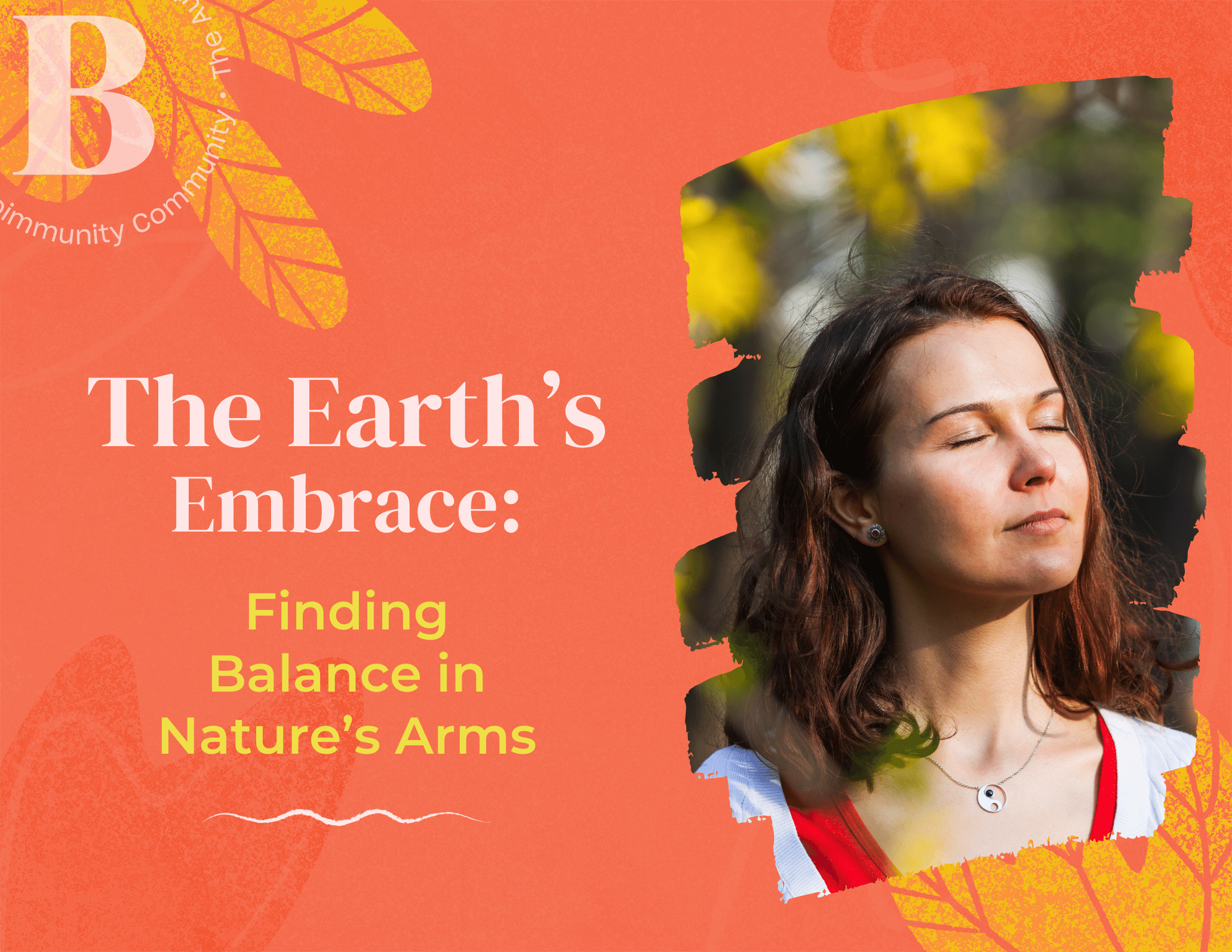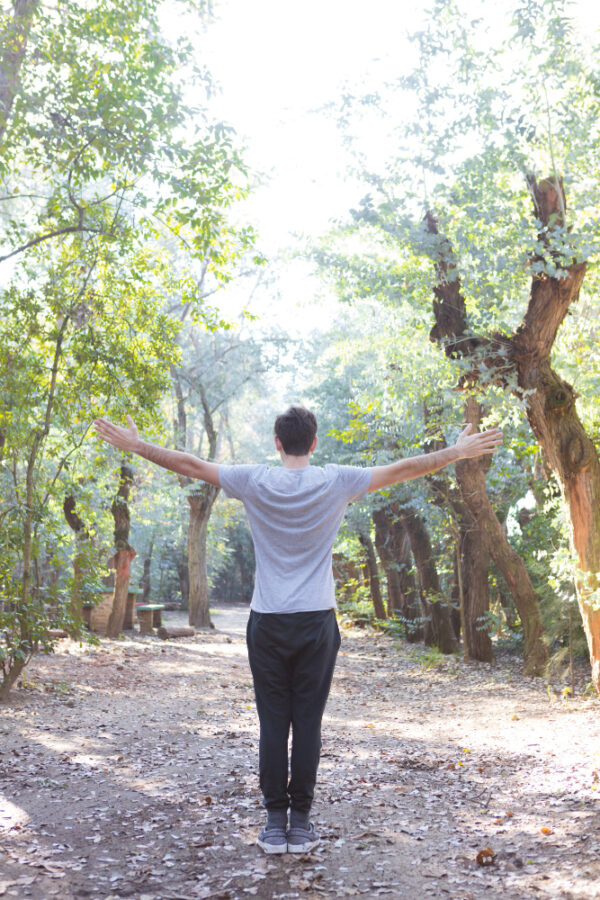
The Earth’s Embrace: Finding Balance in Nature’s Arms
Have you ever thought about how being in nature helps us clear our minds, energizes our bodies, and gives us a grounded feeling of “this is where I’m supposed to be”? Now this might not come as a surprise to some– after all, humankind has lived on Earth for about 7 million years. Think about that. And yet, as humans, the earth we’ve lived and dwelt in for millions of years can sometimes feel so distant or foreign, unlike our ‘home’ we claim it to be.
Interestingly, our ancestors roamed the wild, hunted, and gathered, living in harmony with the rhythms of nature. Their lives were intrinsically linked to the natural world, relying on its cycles for food, shelter, and the regulation of their biological clocks. So much so that nature and spirituality have become so intertwined in some cultures. Quite interesting, isn’t it?
Fast forward to the present, and we find ourselves living in a markedly different environment. But don’t be mistaken, the underlying call here is NOT to go back to “cave style” as that would be counterintuitive. Rather, it is to embrace nature amid the ‘modernity’ of life for all of its wonderful benefits not just for our well-being, but more importantly, autoimmune healing.
The Healing Power of Nature
Recent studies and burgeoning research have illuminated the profound impact that nature has on our physical and mental health. The biophilia hypothesis, introduced initially by Erich Fromm and later by E.O. Wilson, suggests that humans have an innate tendency to seek connections with nature and other forms of life. This innate connection has measurable health benefits, as evidenced by various scientific studies.
Case in point: Research published in the Environmental Research and Public Health journal found that exposure to green spaces can lower blood pressure, reduce stress, and improve immune system function. Another study in the Behavioral Sciences journal highlighted that just viewing natural scenes can enhance recovery rates from stress and increase feelings of wellbeing.
These findings are particularly relevant for individuals living with autoimmune conditions. The anti-inflammatory effect of nature, as noted by researchers, can play a crucial role in autoimmune healing. The stress-reducing properties of nature not only decrease the production of stress hormones but also modulate the immune response, which is crucial for those with autoimmune diseases.
Nature’s Stress-Reducing Effects
The capacity of nature to act as a natural stress reliever cannot be overstated. The sounds of a flowing river, the rustle of leaves in the wind, and the serene silence of a forest can all contribute to a significant reduction in cortisol levels, a primary stress hormone.
This connection between nature and stress reduction was underscored in a study published in Frontiers in Psychology, which found that participants who walked in a forest reported lower levels of stress and better mood compared to those who walked in urban settings.
For autoimmune patients, stress is more than just an emotional or psychological burden; it’s a physical trigger that can exacerbate symptoms and lead to flare-ups. The chronic inflammation characteristic of autoimmune diseases can be aggravated by stress, making the calming effect of nature not just beneficial but essential for maintaining homeostasis, which simply means the body’s way of putting itself back to balance and in order, thereby promoting healing.

Embracing nature doesn’t necessarily mean abandoning the conveniences of modern life. It means integrating nature into our daily lives, whether through weekend hikes, planting gardens, or even spending the first few moments of your waking hours under the morning sun.
The healing power of nature, supported by scientific research, offers a complementary approach to traditional medical treatments for autoimmune diseases. By reducing stress and reconnecting with the natural world, individuals with autoimmune conditions can find a path to balance and healing that aligns with the rhythms of the earth—our first home.
Reconnecting with Nature for Balance and Healing
In today’s fast-paced world, where concrete jungles often drown out the call of the wild, finding moments of tranquility in nature is not just beneficial; it’s essential for our well-being. The gentle whispers of the earth offer a unique form of healing, especially vital for those navigating the complexities of autoimmune diseases. Let’s explore how we can mindfully immerse ourselves in nature’s embrace and how this connection can be a powerful ally in the management of autoimmune conditions.
Nature’s Role in Autoimmune Management
Regular exposure to nature doesn’t just uplift your spirits; it can also be a pivotal element in managing autoimmune diseases. Here’s how:
- Anti-inflammatory Benefits: The stress reduction associated with spending time in nature can lower inflammation in the body. Since autoimmune diseases often involve chronic inflammation, regular nature outings can help manage these conditions.
- Improved Immune Function: Activities in natural settings, like walking or gardening, can boost the immune system, making the body more resilient against autoimmune reactions and improving overall health.
- Stress Management: Autoimmune diseases can be exacerbated by stress. Nature acts as a natural antidote to stress, helping to regulate cortisol levels and reduce the risk of flare-ups.
- Enhanced Vitamin D Production: Sunlight exposure during outdoor activities increases Vitamin D production, which plays a crucial role in immune function and can be beneficial for individuals with autoimmune diseases.
- A Sense of Community and Belonging: Participating in group activities outdoors, such as hiking groups or community gardening, can provide social support and reduce feelings of isolation often experienced by those living with chronic conditions.
This month in the Autoimmunity Community™, we just completed the Skies Before Screens challenge, and we are beyond thrilled to have our members who participated share their experiences and insights as to how this small change has benefited them.
BrightlyThrive™ is committed to empowering individuals with autoimmune conditions to embrace lifestyle adjustments that promote wellness and vitality. Through initiatives like our monthly themed challenges, we aim to inspire healthier habits and foster a supportive community where individuals can thrive despite their autoimmune diagnoses. If this resonates with your health aspirations, we encourage you to apply as a member and join our app-based community in reimagining autoimmunity together!
Practical Steps to Embrace Nature’s Healing
In our journey through life, sometimes the most profound healing comes from returning to our roots, literally and figuratively. The earth, with its boundless generosity, offers us countless opportunities to rejuvenate our spirit, enhance our health, and rediscover balance. Here are some practical ways to embrace nature’s embrace, bringing its healing powers into our daily lives:
🟢 Green Spaces and Well-Being
No matter where you live, the urban jungle can’t keep the natural world entirely at bay. Parks, community gardens, even that tiny patch of grass outside your office window are all invitations from nature to connect.
Make it a daily ritual to spend time in these green spaces. Whether it’s a lunch break under a park tree or a weekend picnic, these moments can significantly uplift your mood and overall sense of well-being.
💆🏻♀️ Nature Therapy Practices
Imagine if we prescribed nature as often as we do medication. How much different would our healing journey be? Practices like Shinrin-yoku, or forest bathing, remind us that healing doesn’t always come in a bottle.
By simply being present in a forest, absorbing its sights, smells, and sounds, we can reduce stress and improve our health. Similarly, gardening can be a meditative practice, fostering a nurturing connection with life. And never underestimate the power of a good nature walk to clear your mind and soothe your soul.
🪴 Integrating Nature into Daily Life
Who says you need to be outside to feel nature’s benefits? Bring elements of the natural world into your home and workplace. Indoor plants, natural light, even pictures of landscapes can help reduce stress and improve productivity.

Consider a desktop fountain for the soothing sound of running water or use natural materials like wood and stone in your decor. These touches can serve as a constant reminder of the natural world’s calming presence.
A Call to Return Home
Our ancestors knew something that we’ve started to forget—the earth is our home, a source of life, healing, and balance. It’s high time we heed the call to return. This isn’t just about autoimmune health; it’s about our collective well-being. Let’s make a conscious effort to reconnect with nature, not as visitors, but as residents of the natural world.
It’s time we consider actually living not just in the moment, but also where we are at. The concept of the earth as our home should empower us to take advantage of all the wonderful things we can enjoy when we engage with it authentically and responsibly.

Resources
Ryff, C. D. (2021, October 21). Spirituality and Well-Being: Theory, Science, and the Nature Connection. Religions, 12(11), 914.
Barbiero, G., & Berto, R. (2021, July 21). Biophilia as Evolutionary Adaptation: An Onto- and Phylogenetic Framework for Biophilic Design. Frontiers in Psychology, 12.
Li, Q. (2009, March 25). Effect of forest bathing trips on human immune function. Environmental Health and Preventive Medicine, 15(1), 9–17.
Ibe, O. (2023, May 4). Earthing–A Technique to Help Ground Your Body. Verywell Mind.
Angelo, B. (2022, May 31). Wellbeing Gardening for the Body, Mind and Spirit. Deep Green Permaculture.
Kondo, M., Fluehr, J., McKeon, T., & Branas, C. (2018, March 3). Urban Green Space and Its Impact on Human Health. International Journal of Environmental Research and Public Health, 15(3), 445.
Nature Journaling – Kenai Fjords National Park (U.S. National Park Service). (n.d.).
Berto, R. (2014, October 21). The Role of Nature in Coping with Psycho-Physiological Stress: A Literature Review on Restorativeness. Behavioral Sciences, 4(4), 394–409.
TAGS:
CATEGORIES:









